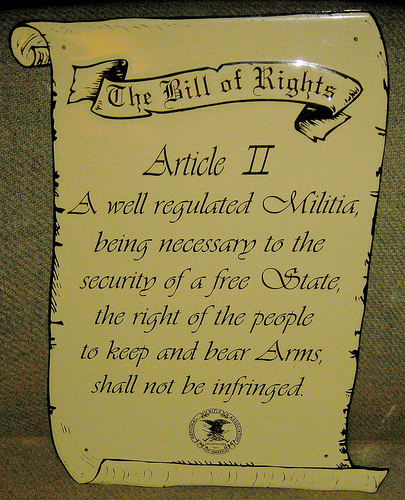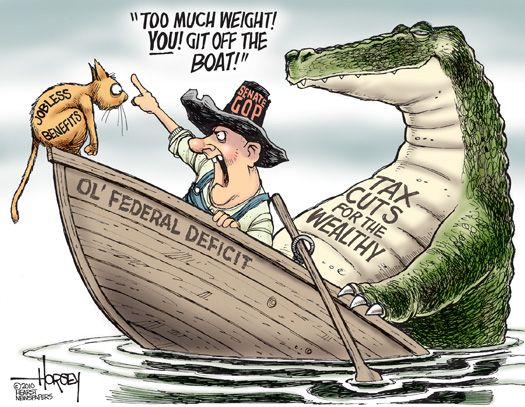"I don't know what you mean by 'glory,' " Alice said.
Humpty Dumpty smiled contemptuously. "Of course you don't—till I tell you. I meant 'there's a nice knock-down argument for you!' "
"But 'glory' doesn't mean 'a nice knock-down argument'," Alice objected.
"When I use a word," Humpty Dumpty said, in rather a scornful tone, "it means just what I choose it to mean—neither more nor less."
"The question is," said Alice, "whether you can make words mean so many different things."
"The question is," said Humpty Dumpty, "which is to be master—that's all."
Alice was too much puzzled to say anything, so after a minute Humpty Dumpty began again. "They've a temper, some of them—particularly verbs, they're the proudest—adjectives you can do anything with, but not verbs—however, I can manage the whole lot! Impenetrability! That's what I say!"
-- From Lewis Carroll's Through the Looking-Glass (1872)
I have to admit to feeling rather like Alice recently.
Yes, I'm aware that people will have varying opinions, and that there will inevitably be different interpretations of written works. There are a number of theologians, for example, that have strong but opposing interpretations of the scriptures on matters more than trivial, from pacifism and capital punishment to divorce and gender roles. In the business world, attorneys representing two different parties bound by an agreement or contract may argue for opposing interpretations of the same document. In politics, elected officials and pundits wage war every day over what the US Constitution does and does not "say". As long as the human race may endure, such debates will never cease.
What concerns me is just how malleable even those interpretations have become, especially with regard to the Constitution. Just as some Christians love to wave the Bible around, and proclaim their love loudly for the Word that they may never even read (yet they are certain of what it says and what it really means), public displays of affection for the US Constitution have become almost a requirement, especially for conservatives. I do not doubt that the men and women who swear to uphold the Constitution of the United States are, in fact, sincere in their devotion to the historical document, but I am concerned that they consider it as clay, rather than of iron. Varying interpretations aside, in order for anything to have any meaning at all, there must at least be some consistency, and consistency appears to have been mortally wounded by situational pragmatism.
Certainly, there is nothing new with the political flip-flop. Both parties have waffled on a number of issues, and continue to do so, even though curious constituents today have technology at their disposal. One can pull up videos of a politician in campaign mode and compare them to his or her words as an elected official. Fact checking sites like Snopes and PolitiFact can weed out reality from hearsay (or even engineered rumor). One recent example was the change in Senate rules known as the "nuclear option"; we can easily see for ourselves that President Obama and Harry Reid each argued against the very rule change in 2005 (when it would aid the Republican majority) that they supported just a few months ago (when it would be an advantage to Democrats). During the last presidential election, Mitt Romney was attacked by both the right and left for "being for it before he was against it", especially with regard to the hot-button issues of abortion and health care reform. It is obvious that such convenient changes in position plague both parties.
The recent focus on the Constitution of the United States, however, has caused these sadly commonplace turnarounds to evolve into something more dangerous. As mentioned earlier, there are a number of different opinions within the church on a number of issues, but the moment one adds, "the Bible says...", the line is crossed. No longer is the speaker giving a personal opinion, but wading into fact (or untruth); such escalation should not be taken lightly. Likewise, when people start throwing the Constitution around, I tend to be more critical of the speaker - and when that speaker becomes self-contradictory from a lack of consistent interpretation, I can't help but notice.
Graham to Constitution: All of Me Loves All Some of You
Is it possible to simultaneously praise the Constitution and propose trashing some of it? Senator Lindsey Graham (SC) apparently thinks so. In the video below, Senator Graham responds to a prodding Piers Morgan concerning the second amendment.To clarify, I agree with Senator Graham on the issue of the second amendment, and said as much in a recent post about the gun control debate. Surely, constitutional rights must not be subject to the approval of others. Senator Graham's own words at the end of this video are worth noting:
"...if my individual rights under the Constitution are limited by the sensibility of others, I don't have a whole lot of rights."But a subsequent amendment begins:
AMENDMENT XIV
SECTION 1. All persons born or naturalized in the United States, and subject to the jurisdiction thereof, are citizens of the United States and of the state wherein they reside.Yet, Senator Graham recently proposed a repeal of the 14th amendment. His apparent devotion to the COTUS extends to some amendments, but not others; his rights are protected, those of others, not so much. To be fair, Republicans split over this issue, with many objecting to the re-write, but it is interesting to note that while the majority of Republicans have labeled President Obama's efforts to expand background checks or to ban certain rifles as "an attempt to repeal the second amendment", none have suggested that Senator Graham's literal attempt to repeal a constitutional amendment makes him a threat to the Constitution.
Birther Backtrack
No need to go into the history of this one. Anyone of legal voting age in 2008 (and perhaps even some younger) will recall the nationwide outrage over Barack Obama's place of birth. Although there was no Kenyan birth certificate to document the claim, approximately 40 percent of Republicans still believed that Obama was not born in the United States in July of 2010. Why was his birthplace of such interest to conservatives, especially those who considered themselves part of "the tea party"? The answer is found in Article 2, Section 1, Clause 5:
No Person except a natural born Citizen, or a Citizen of the United States, at the time of the Adoption of this Constitution, shall be eligible to the Office of President; neither shall any person be eligible to that Office who shall not have attained to the Age of thirty five Years, and been fourteen Years a Resident within the United States.The interpretation of this clause was that Obama would have had to been born in the United States in order to be eligible for the presidency. I disagree with this interpretation, but again, my issue is not so much with a different view than with gross inconsistency. The Tea Party proclaimed that Obama was an ineligible fraud. So as to not also disqualify John McCain, who was born in Panama, Conservative Daily added a bit of a rider:
The phrase “natural born citizen” is widely interpreted to mean being born on American soil or being born of two American citizens....Therefore, the question becomes whether or not Barack Hussein Obama, Jr. was born in Hawaii or was he in fact born in Kenya and therefore INELIGIBLE to be the U.S. President?The message was repeated over and over: his foreign father was of concern; he must be able to produce an American birth certificate in order to be eligible.
Imagine my surprise, then, upon reading that in a recent poll of Tea Party conservatives, the one person with the highest amount of support in the next presidential election was none other than Rafael "Ted" Cruz, the foreign-born son of a white mother who was an American citizen by birth and an ethnic, foreign-born father. Even before this poll, Forbes Magazine pointed out the obvious and unavoidable double standard given the political rise of Senator Cruz. Apparently, the Constitution means just what some choose it to mean, and only until they choose for it to mean something else.
Following Suit
Back in 1998, Republican Whip Tom DeLay was pushing for a vote of impeachment against President Bill Clinton, for lying under oath about his sexual relationship with intern Monica Lewinsky. While some Democrats (and even President Clinton himself) were trying to steer the House response toward "censure", DeLay countered that the only recourse for the House of Representatives to reprimand the President's actions was the process of impeachment. Anything else "violates the rules of the House", Representative DeLay warned. "It's unconstitutional. It's a terrible precedent." An article in the Washington Post (December 15, 1998) echoed the same:
In their decision to remove censure as an option in the debate over how to punish the president, House Republican leaders have found comfort and cover in the Constitution, arguing that voting on the lesser penalty would violate the separation of powers and create a precedent not envisioned by the framers of the Constitution.
Article I, Section 2: "The House of Representatives shall chuse [sic] their Speaker and other Officers; and shall have to sole power of impeachment."
Article I, Section 3: "The Senate shall have to sole Power to try all Impeachments. When siting for that Purpose, they shall be on Oath or Affirmation. When the President of the United States is tried, the Chief Justice shall preside: And no Person shall be convicted without the Concurrence of two thirds of the Members present.
Article II, Section 4: "The President, Vice President and all civil Officers of the United States, shall be removed from Office on Impeachment for, and Conviction of, Treason, Bribery, or other high Crimes and Misdemeanors."
Once again, my point here is not to support President Obama or to take sides one way or the other if the use of executive orders qualifies as "treason, bribery, or other high crimes and misdemeanors". Some believe that the President has acted unlawfully, and some do not, largely by party lines, and the Constitution does give the House of Representatives the sole discretion of deciding what qualifies as an impeachable offense. They are then to vote on it, and if there is more "yea" than "nay", the case goes to the Senate, presided over by the Chief Justice. This is the avenue provided to the House by the Constitution of the United States.
The Constitution does not mention "censure", nor allow for the Speaker of the House to sue the President on behalf of the entire House of Representatives. In spite of this inconvenient truth, the House voted on July 30th to authorize such action. In other words, Speaker Boehner suggested that the President had acted beyond the authority granted to him by the Constitution of the United States, and that in response the House would act beyond the authority granted to it by the Constitution of the United States. While suggesting that the President was trying to circumvent the process of amending law, House Republicans were writing HRES 676, which appears to be an attempt to circumvent the process of impeachment.
Calls to impeach the current president have been fairly constant over the past few years; in fact, the cry to impeach Barack Obama began as soon as he won the 2008 election, before he even took office. Much like Super Bowl Champion hats and T-shits, there were boxes of signs and bumper stickers urging impeachment ready to go in case the McCain/Palin ticket was unsuccessful. In my opinion, while there are some actions by the Obama administration that I can't agree with, nothing is so egregious as to require a vote of impeachment. I understand that many Republicans disagree with that, and they are welcome to make a case for impeachment. Going through the back door, however, is exactly what they claim to be fighting against.


























